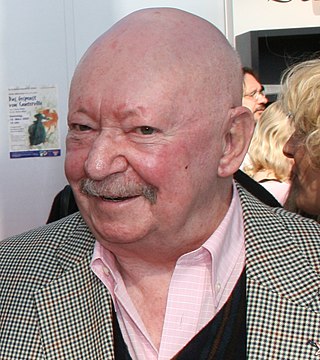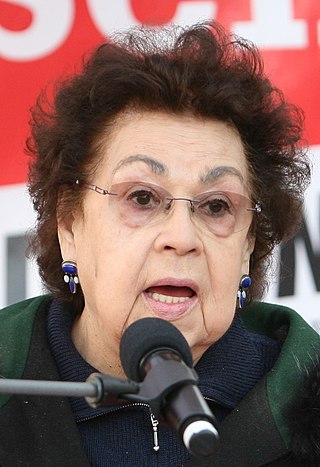Related Research Articles
Mascha Kaléko was a German-language poet.

Günter Kunert was a German writer. Based in East Berlin, he published poetry from 1947, supported by Bertold Brecht. After he had signed a petition against the deprivation of the citizenship of Wolf Biermann in 1976, he lost his SED membership, and moved to the West two years later. He is regarded as a versatile German writer who wrote short stories, essays, autobiographical works, film scripts and novels. He received international honorary doctorates and awards.

Arnold Stadler is a German writer, essayist and translator.

Eva Strittmatter was a German writer of poetry, prose, and children's literature.

Elizabeth Shaw was an Irish artist, illustrator and children's book author, active in Germany.
Christa Reinig was a German poet, fiction and non-fiction writer, and dramatist. She began her career in the Soviet occupation zone which became East Berlin, was banned there, after publishing in West Germany, and moved to the West in 1964, settling in Munich. She was openly lesbian. Her works are marked by black humor, and irony.
Wulf Kirsten was a German poet, novelist, and publisher. He is known for his nature poetry and his essays on the history and culture of Saxony.
Nevfel Cumart is a German author, lecturer, literary translator and journalist of Turkish descent.

Helga Königsdorf was an East German author and physicist.

Elfriede Brüning was a German communist journalist and novelist. She also used the pseudonym Elke Klent.

Gerhard Rühm is an Austrian author, composer and visual artist.

Gisela Steineckert is a German writer known for her books and song lyrics. She has also written numerous radio plays and several film scripts. In terms of published output she was particularly prolific before 1989, but her professional career has nevertheless outlasted the German Democratic Republic.
Heinz Kahlau was a German writer.
Günter Herburger was a German writer. He was initially counted among the "New Realists" funded by Dieter Wellershoff, became the author of socialist, imaginative utopian worlds since the 1970s and took an outsider position in German-language contemporary literature. He was a writer of poems, children's books, radio plays and a member of the PEN Center Germany.
Waldtraut Lewin was a German writer, dramaturge and stage director.

Elke Erb is a German author-poet based in Berlin. She has also worked as a literary editor and translator.

Peter Hamm was a German poet, author, journalist, editor, and literary critic. He wrote several documentaries, including ones about Ingeborg Bachmann and Peter Handke. He wrote for the German weekly newspapers Der Spiegel and Die Zeit, among others. From 1964 to 2002, Hamm worked as contributing editor for culture for the broadcaster Bayerischer Rundfunk. He was also a jury member of literary prizes, and critic for a regular literary club of the Swiss television company Schweizer Fernsehen.

Ilma Rakusa is a Swiss writer and translator. She translates French, Russian, Serbo-Croatian and Hungarian into German.
Irina Liebmann is a German journalist-author and sinologist of Russo-German provenance. She has won a number of important literary prizes: the most significant of these, probably, was the 2008 Leipzig Book Fair non-fiction Prize, awarded for "Wäre es schön? Es wäre schön!", a biography of her father, a noted anti-Nazi activist and political exile in Warsaw and Moscow who, after 1945, returned to what became, in 1949, the German Democratic Republic and in 1953, despite his longstanding record of communist activism, emerged as an uncompromising critic of the East German leader Walter Ulbricht: he was expelled from the party and suffered various other government mandated public indignities. She grew up and lived the first part of her adult life in the German Democratic Republic, but succeeded in moving to West Berlin during 1988, thereby anticipating reunification by more than a year.
Clara Hepner also known by the pseudonym Klara Hepner, or Clara Muschner, Klara Muschner, sometimes Clara Hepner-Muschner, born Clara Freund in Görlitz, in Lower Silesia, Germany. She is best known as a poet and author of children's stories.
References
- ↑ "Schriftstellerin Gisela Kraft gestorben". Die Schriftstellerin und Übersetzerin Gisela Kraft ist tot. Sie starb am Dienstag nach langer Krankheit im Alter von 74 Jahren in Weimar ... Augsburger Allgemeine. 5 January 2010. Retrieved 11 December 2017.
- 1 2 "Gisela Kraft ... Biographie" (PDF). Dr. Lukrezia Jochimsen, Hamburg. Archived from the original (PDF) on 3 January 2013. Retrieved 11 December 2017.
- 1 2 Paul Plagge (7 January 2015). Kraft, Gisela (1936-2010). p. 224. ISBN 978-3-7347-4912-4.
{{cite book}}:|work=ignored (help) - 1 2 3 4 Frank Quilitzsch (3 July 2013). "Das Vermächtnis einer eigenwilligen Dichterin". Gisela Krafts deutsch-deutsche Erinnerungen "Mein Land, ein anderes" erscheinen nun doch. Mediengruppe Thüringen Verlag GmbH, (Ostthüringer Zeitung) Erfurt. Retrieved 12 December 2017.
- ↑ Die Schriftstellerin ist im Alter von 74 Jahren nach langer Krankheit in Weimar gestorben. Besonders für ihre Übersetzungen aus dem Türkischen wurde sie ausgezeichnet. (5 January 2010). "Gisela Kraft ist tot". ZEIT ONLINE GmbH, Hamburg. Retrieved 12 December 2017.
- ↑ Gisela Kraft (1978). Fazil Hüsnü Dağlarca : Weltschöpfung und Tiersymbolik. Freiburg . K. Schwarz. ISBN 978-3-879-97065-0.
- ↑ Tilman Krause (7 January 2010). "Gisela Kraft, Dichterin und Übersetzerin, ist tot". WeltN24 GmbH. Retrieved 12 December 2017.
- 1 2 Martin Schmidt (27 July 2010). "Die Lausitzer und deren Kultur". ... Seit mehr als vier Jahrzehnten pflegt der Hoyerswerdaer Kunstverein gemeinsam mit den sorbischen Landsleuten der Lausitzer die Kenntnis von deren Kultur. Lausitzer VerlagsService GmbH, Cottbus (Redaktion Hoyerswerda). Retrieved 12 December 2017.
- 1 2 3 Barbara Thalheim (1 July 2016). "Frau Kraft, Gisela, Gisel, Giselchen…" . Retrieved 12 December 2012.
- ↑ "Die Lesung erinnerte an die Schriftstellerin Dr. Gisela Kraft (1936-2010)". Der Zeitfluss kennt sein Ende nicht - das 32. Fest der sorbischen Poesie. Hoyerswerdaer Kunstverein e.V. 12 July 2014. Retrieved 12 December 2017.
- ↑ Stefan Weidner. ""He Schicksal, gemeine Hure!" .... Die Gedichte des türkischen Lyrikers Nazim Hikmet sind in Vergessenheit geraten, zu Unrecht, denn Hikmet zählt zu den größten Dichtern des Zwanzigsten Jahrhunderts. Nun lädt eine neue Ausgabe ein, die Gedichte des Künstlers wiederzuentdecken: "Die Namen der Sehnsucht."". review of Nazim Hikmet: Hasretlerin Adi. Die Namen der Sehnsucht, Gedichte. Übersetzt von Gisela Kraft, Ammann Verlag, Zürich 2008. Deutschlandradio, Köln. Retrieved 13 December 2017.